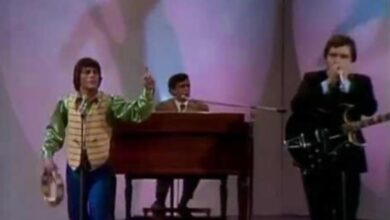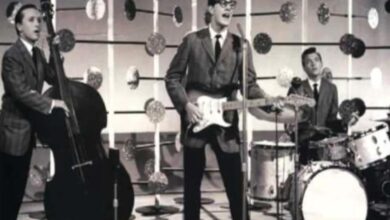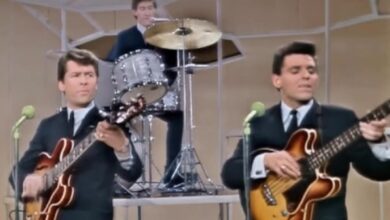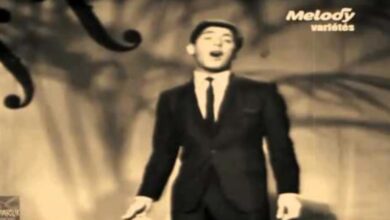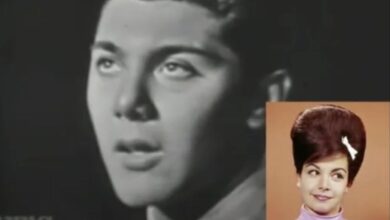Josh Turner Offered a Moving Homage with His Soulful Rendition of “He Stopped Loving Her Today”
When George Jones released “He Stopped Loving Her Today” in 1980, few could have predicted the emotional depth it would bring to country music and beyond. The song’s moving story, centered on a man whose love remains unbroken until his final breath, redefined how heartbreak could be expressed in song. More than four decades later, its raw sincerity continues to stun new audiences, securing its status as one of the most powerful recordings in music history.
The lyrics unfold with deliberate precision, guiding listeners toward a heart-shattering ending. Each verse reveals more about a love that never faded, culminating in the poignant twist that the man’s devotion ended only in death. Jones’s unmatched delivery—rich with sorrow and authenticity—imbues every line with gravity. The understated production heightens the song’s emotional weight, allowing the story to take center stage as one of country’s most haunting ballads.
In 2006, Josh Turner offered his interpretation during the Cracker Barrel Country Songs of the Year Concert. With his deep, velvety baritone, Turner breathed new life into the classic, honoring its tragic essence while resonating with a younger audience. Rather than mimic Jones, he respected the original’s spirit while adding his own texture, demonstrating that timeless songs can maintain their impact through thoughtful reinterpretation. His performance acted as both homage and renewal.
For Jones, the song marked a defining moment in his career. At a time when his personal struggles threatened his professional standing, it became his redemption. The track earned him multiple awards, including a Grammy, and returned him to the top of the charts. More importantly, it proved that deeply emotional and somber material could succeed commercially, inspiring other artists to embrace vulnerability in their work.
The influence of “He Stopped Loving Her Today” reached far beyond the country genre. Its themes of unwavering love and unresolved grief connected with people from all walks of life. In an era increasingly defined by fast consumption and fleeting trends, the song stood as a reminder of patience, enduring pain, and profound devotion. It continues to captivate listeners who might otherwise overlook country music, drawn in by its human truth.
Recent discussions about emotional health have added new relevance to the song. The central figure’s inability to move on from heartbreak has been cited as a poignant illustration in conversations about grief and mental well-being. Some mental health professionals reference it when explaining how unprocessed sorrow can lead to emotional stagnation. For many listeners, the song mirrors their own experiences, offering solace and validation during times of loss.
Streaming platforms have kept the song alive, introducing it to fresh audiences. It frequently appears in playlists dedicated to heartbreak and deep reflection, catching the attention of listeners unfamiliar with Jones. First-time reaction videos on YouTube show viewers visibly moved, often pausing to process the emotional blow of the final verse. Comment sections under these videos have become shared spaces where strangers connect through stories of love and loss.
On social media platforms like TikTok, the song has found new life through reinterpretations by both fans and musicians. Acoustic covers, lo-fi remixes, and hashtag challenges keep it trending, ensuring that its message continues to reach younger listeners. These modern versions do not diminish the original’s meaning—instead, they highlight its adaptability and enduring emotional power.
For many, the song holds a deeply personal place in life’s most vulnerable moments. It’s often chosen for memorial services or as a tribute to lost loved ones. Others include it in therapy sessions or personal playlists for processing grief, using its blunt honesty to start conversations that might otherwise remain unspoken. In these ways, the track transforms from music into a companion through sorrow.
Individual experiences with the song add to its legacy. Whether discovered on an old record, in a digital playlist, or through Josh Turner’s moving cover, the connection listeners feel is uniquely personal. Sharing these moments—whether in online forums, private conversations, or public tributes—helps pass the song to new generations, keeping its emotional truth alive.
The Cracker Barrel performance by Turner further demonstrated the song’s elasticity. Stripped down yet faithful to the spirit of the original, it introduced the narrative to an audience who might never have heard Jones’s version. By respecting the song’s heart while offering his own voice, Turner reinforced the idea that great music thrives when reimagined with care.
In both versions, the arrangement’s simplicity is key to its power. Minimal instrumentation leaves space for the vocals to carry the story. The pauses between phrases feel heavy with meaning, allowing listeners to sit in the ache. This sparseness is part of why the song transcends generations—it invites personal reflection without distraction.
The cultural staying power of “He Stopped Loving Her Today” also lies in its universality. While rooted in country tradition, its central themes are not bound by genre or geography. It tells a story anyone can understand: the kind of love that defines a life, and the pain of its absence. This universality is what makes it equally impactful to a first-time listener and someone revisiting it decades later.
YouTube and TikTok have turned parts of the song into viral moments, with creators reacting to its twist ending or analyzing its lyrics in depth. This exposure has sparked renewed interest in Jones’s broader catalog, pulling new fans into the world of classic country storytelling. In this way, digital culture has become an unexpected ally in preserving the song’s relevance.
Ultimately, “He Stopped Loving Her Today” endures because it tells the truth—about love, loss, and the fragility of the human heart. Whether voiced by George Jones at the height of his redemption or Josh Turner decades later, the song retains its devastating power. It’s more than a ballad; it’s a timeless reminder that some emotions, once set in motion, never truly fade.
